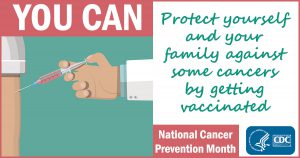Vaccination Nation: A Real Shot at Preventing Cancer
Posted on by Suppose someone tells you there are quick, easy ways to help keep people from getting some kinds of cancer. Would you believe it?
Suppose someone tells you there are quick, easy ways to help keep people from getting some kinds of cancer. Would you believe it?
Luckily, you can. You already know vaccines stop you from getting dangerous diseases from bacteria and viruses. You don’t even realize you have some viruses because they may not cause any symptoms. But a few of them can lead to cancer if left untreated.
HPV: Three Letters You Should Know
You’ve probably had HPV, or human papillomavirus. It’s so common that nearly everyone gets it at some point in their lives. Although 9 out of 10 infections go away on their own, some stick around, and can cause cancer of the cervix, vulva, vagina, penis, anus, and the back of the throat. In a lot of cases, you won’t know you have cancer until it’s serious and harder to treat.
Hepatitis: “B” Aware
You may or may not know about hepatitis, which is an inflammation of the liver that can be caused by viruses. Hepatitis B infection is important to talk about, because this type can stay in the body for a long time and cause liver cancer.
If you don’t know you’re infected, you and your doctor may not know to look for liver cancer. That’s why it isn’t often caught until it is serious or life-threatening.
Start Preventing Cancer Early
Parents, your doctor probably won’t give you the HPV vaccine. But there’s good news for your kids—both boys and girls should get the vaccine at around age 11 or 12. Some people up to the age of 26 should get the vaccine—talk to your doctor about whether your older teens or young adult children should have it.
If you have a new baby, he or she should get the hepatitis B vaccine as part of a normal immunization schedule. But children and teens who are 1 to 19 years old can also get it if they haven’t been vaccinated previously. If you’re at risk, you should get the hepatitis B vaccine, too.
You can do so many other things that help lower your kids and teens’ risk for cancer—like encouraging them to eat healthy and stay active, discouraging tobacco use, and protecting their skin from the sun. Vaccines are another great way to lower your kids’ cancer risk as they grow up. And they can pass along those healthy choices to their own families.
Post a Comment